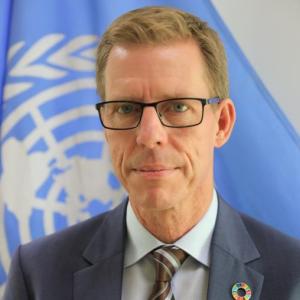Your Excellency Nasser Shraideh, Minister of Planning
Your Excellency Dr. Khair Abu Saalik, Chair of Jordan Economic Forum
Your Excellencies, colleague, guests, and friends,
It is my great honor to be with you here today in this UN Talk that we are co-hosting in close collaboration with UNDP and Jordan Economic Forum, which is part of a series of Talks we are organizing under the UN Socio-Economic Framework in response to COVID-19.
The past one and a half year was like no other, where the world has not only faced challenges related to the health impact of COVID-19 pandemic, but also the socio-economic impact that almost affected all aspects of our lives.
A shadow pandemic that has exposed the inequalities of our societies and exacerbated existing vulnerabilities, making more difficult for vulnerable people to make a living and to access opportunities.
The unprecedented pandemic has had negative effects on people’s economic and social lives and businesses through multiple and interconnected channels across the globe.
In Jordan, mandatory lockdowns, precautionary border closures and mobility restrictions obstructed business sector, particularly small and medium sized enterprises (SMEs) through reducing or closuring their activities that also resulted with significant downturns in labor market.
Women and youth have been particularly affected by this, and more then before are out of the labour force. This is a great loss for the Jordanian society. Only 14% of women are in the labor force in Jordan and out of those, only 11% are employed. And according to recent estimates, 50% of youth are unemployed.
The COVID-19 pandemic has affected private sector at all scales in the Jordanian economy, but more severely disrupted the SMEs and micro-based family enterprises particularly in labor-intensive and informal sectors, such as agriculture and tourism.
The Government of Jordan has taken several measures and introduced numerous laws, regulations and reforms, and imposed expansionary fiscal and accommodative monetary policies to minimize socio-economic cost of this crisis.
Now, while we are not fully out of the woods, as we engage in the economic recovery journey, we have new opportunities to “Build Forward Better” to strengthen the resilience of the Jordanian economy, to reduce inequalities, to build a more inclusive society.
The UN Socio-Economic Framework (SEF) for Covid-19 Response provides some key entry points for such approach. Digital transformation, environmental sustainability and green interventions, inclusion, gender focus and a rights-based agenda are just a few examples to accelerate a better recovery.
The ‘economic recovery’ pillar of the UN Socio-Economic Framework proposes a combination of macro-level interventions that includes both fiscal policy as well as enterprise support measures as well as employment and livelihood opportunities for affected workers to mitigate the impact of COVID-19 on the economy.
Today’s talk will shed light on these two pillars of the Framework, i.e. Macro-economics and Multilateral Cooperation; and Social Cohesion and Resilience. As part of our commitment to this area, UNDP and ILO have been conducting an analytical study to periodically examine potential effects of COVID-19 crisis on business sector in the Jordanian economy. This study has provided specific policy recommendations that would help to design and implement policies and provide services in support of workers’ protection and supporting digital technologies in private sector.
The UN system is ready to continue engaging with the Government and all stakeholders of the Jordanian society to build forward better, together, for the future generations.
Finally, I am glad that this Talk is bringing together partners from different sectors, the Government of Jordan, the World Bank, the private sector, and the UN. And I hope this would be the start towards strengthening our collaboration towards coming together with better future solutions.



